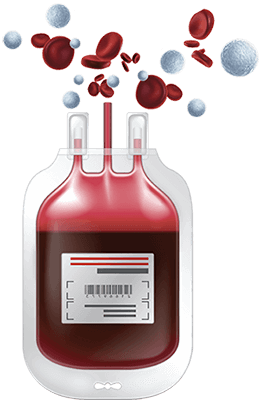Canada's Largest & Oldest Cord Blood Bank
Have you enjoyed your first month of parenthood? You are probably starting to feel a lot more comfortable and confident about being a mom.
Milestones This Month

Most babies can
- Roll over from tummy to back
- Play with hand and feet
- Distinguish between bold colours

Half of the babies can
- Turn towards sound

A few babies can
- Sit without support for a few seconds
- Roll over from back to tummy
- Put objects in mouth
- Dislike strangers
Newborn Development
You will notice at your 1-month-old appointment that your baby has grown both in length and weight. If you are one to track weight, according to the World Health Organization charts an average 1-month-old will weigh around 9.2 pounds (4.17 kilograms) if it’s a girl or 9.9 pounds (4.49 kilograms) if it’s a boy. Your baby is getting stronger and more accustomed to the new world around.

Your little one is able to hear everything well now. He or she may be startled by loud noises and start crying. Around 50% of the babies will coo, hum or gurgle at this young age. You may even be able to distinguish between your little one’s cries. Make sure you talk back to your baby. He or she will need your support to develop all of the senses.
Your baby’s other senses are developing rapidly as well. If you are breastfeeding your baby will be able to both smell and taste your milk. You probably notice that he or she is able to recognize you based on smell.

Baby Tip
Your little one enjoys the feel of soft things. Invest in a nice fluffy blanket and a few cuddly toys.

Supporting Your Baby
Feeding
At this point, your breastfed baby is able to let you know when they are full. He or she will become more and more efficient at feeding, so the time spent breastfeeding will decrease with time. Your formula-fed baby may be taking 4 ounces of milk every 4 hours right now.
There is a rapid growth spurt around six weeks where your baby’s milk intake will increase. You will notice that your baby keeps wanting to feed or appear hungry after he or she finishes the bottle.
Tummy time
If you haven’t already, it is time to start giving your baby ‘tummy time’ now. Placing your baby on his or her tummy encourages the development of head control and other important motor skills. It is highly likely your baby will hate tummy time at the beginning. Start with a short interval and keep increasing the time by few minutes at a time. Supervise your baby at all time!

Bowel movements
Your baby may have already established a pattern between his or her feeing schedule and bowel movements. A 1-month-old should be pooping at least twice a day. But because it is digested more efficiently, breastfed babies can sometimes go a few days between bowel movements. Just make sure your baby’s poop is not hard or comes out in small balls. This can mean that your baby is constipated. Giving your baby a tiny amount of prune juice or pear juice may remedy this situation.
Sleep
Your 1-month-old may also have somewhat of a routine established already. A typical 1-month-old sleeps about 15 to 16 hours per day. Your baby’s routine at the moment probably includes three daytime naps and then about 8 to 10 hours of sleep at night (waking up to feed every 3-4 hours of course).
Just remember every baby is different! You may have a night-owl who likes to stay up at night or a baby that need much less (or more) sleep than this. If you are worried about your sleep, talk to your healthcare provider about it.
Share your knowledge and make money doing it





